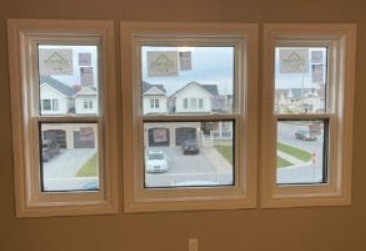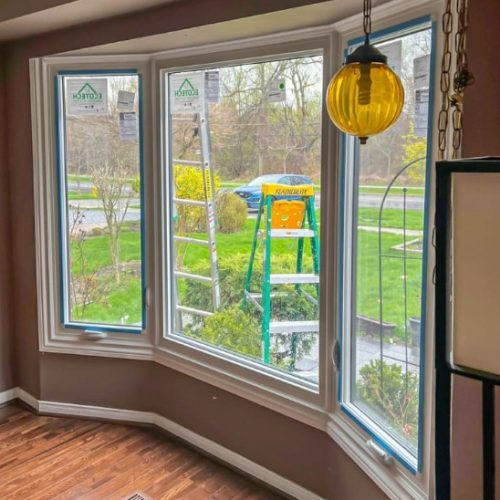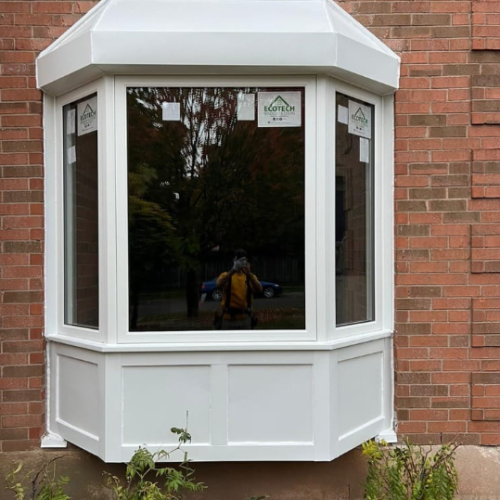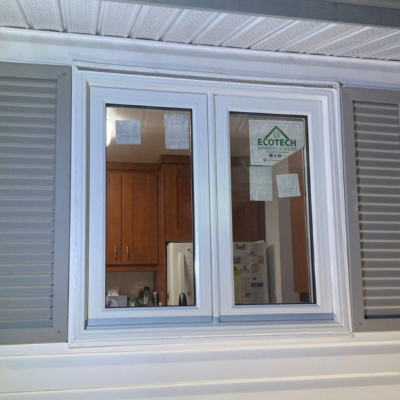Nothing is more frustrating than looking out your window on a beautiful day only to find your view obscured by foggy glass that won’t wipe clean. This persistent haze trapped between window panes is a telltale sign of condensation in windows, and it’s becoming an increasingly common concern for homeowners across Canada.
While modern double and triple-pane windows are designed to provide excellent insulation and energy efficiency, seal failures can lead to moisture infiltration that not only blocks your view but also compromises your window’s performance and your home’s comfort. At EcoTech Windows & Doors, we understand how important clear, efficient windows are for Canadian homes, and we’re here to help you understand why condensation happens and how to prevent it effectively.
What Causes Condensation Between Window Panes?
Condensation between glass panes occurs when the sealed unit loses its integrity, allowing moisture to enter the space between the glass layers. Here’s how it happens:
Seal failure:
The rubber or adhesive seals around the window perimeter deteriorate over time.
Temperature fluctuations:
Canada’s extreme weather changes cause expansion and contraction.
Humidity infiltration:
Moisture enters through compromised seals and gets trapped.
Insulating gas escape:
Argon or krypton gas fills leaks out, reducing insulation effectiveness
High-Risk Areas in Canada:
Certain regions and conditions make condensation more likely:
- Waterfront properties with high humidity levels
- Homes near lakes or rivers where moisture is abundant
- Older homes built before modern sealing techniques
- Properties with poor ventilation systems

Signs and Problems Caused by Condensation Between Glass Panes:
Identifying condensation early can save you from bigger problems down the road.
Key Warning Signs:
- Foggy or hazy appearance between glass panes
- Water droplets visible inside the window unit
- Mineral deposits or staining on interior glass surfaces
- Decreased visibility that doesn’t improve with cleaning
Potential Consequences:
- Reduced energy efficiency: Lost insulation leads to higher heating costs
- Aesthetic issues: Permanent fogging affects home appearance and value
- Mold growth: Trapped moisture creates ideal conditions for mold
- Structural concerns: Prolonged moisture can damage window frames
Common Window Types Affected by Condensation:
Window Type | Susceptibility Level | Common Causes |
Double-pane | Moderate to High | Seal deterioration, age-related failure |
Triple-pane | Low to Moderate | Manufacturing defects, extreme weather |
Low-quality units | Very High | Poor materials, inadequate sealing |
Premium windows | Very Low | Superior seals, quality construction |

Effective Methods to Prevent Condensation:
Prevention is always better than dealing with condensation after it occurs.
Professional Installation Standards:
- Proper sealing techniques using high-quality sealants
- Correct spacing and alignment during installation
- Quality control checks for seal integrity
- Use of appropriate flashing and weatherproofing
Material Quality Matters:
- Low-E coatings: Reflect heat while maintaining visibility
- Argon gas fills: Provide superior insulation between panes
- High-grade seals: Last longer under Canadian weather conditions
- Durable frames: Support glass units without warping

DIY Tips to Minimize Condensation in Windows:
While professional solutions are most effective, homeowners can take steps to reduce risk:
Humidity Control:
- Maintain indoor humidity between 30-50% year-round
- Use exhaust fans in bathrooms and kitchens
- Install dehumidifiers in basements and humid areas
- Ensure proper attic and crawl space ventilation
Air Circulation Techniques:
- Keep blinds slightly open to allow airflow
- Use ceiling fans to improve air movement
- Avoid blocking vents near windows
- Open windows periodically for fresh air exchange
Quick Fixes:
- Place moisture absorbers near problem windows
- Check and clean window weep holes regularly
- Inspect caulking around window frames annually
When to Replace Windows Due to Persistent Condensation?
Sometimes condensation indicates that windows have reached the end of their useful life.
- Condensation persists despite humidity control efforts
- Multiple windows showing the same problem
- Windows are over 15-20 years old
- Energy bills have increased significantly
Benefits of Upgrading:
- Modern sealing technology prevents future condensation issues
- Energy efficiency improvements reduce heating and cooling costs
- Enhanced comfort with better temperature control
- Increased home value with premium window installations
How EcoTech Windows & Doors Can Help?
Our team specializes in preventing and resolving condensation issues for Canadian homeowners:
- Professional inspections to identify problem areas and root causes
- Premium window solutions designed specifically for Canadian climates
- Expert installation ensuring proper sealing and long-term performance
- Ongoing maintenance support to keep your windows functioning optimally
We understand that every home is unique, and our experienced technicians provide customized solutions that address your specific condensation challenges while enhancing your home’s energy efficiency and comfort.

Conclusion
Preventing condensation in windows starts with understanding the causes and taking proactive steps to address them. While some maintenance tasks can be handled by homeowners, the most effective solutions involve professional installation of quality windows with superior sealing technology. Don’t let foggy windows compromise your home’s comfort, efficiency, or curb appeal.
Ready to say goodbye to condensation problems for good? Contact EcoTech Windows & Doors today for a comprehensive window assessment and personalized solutions. Contact us today: Call us at 888-880-6827, send us an email at info@ecotechwindows.ca, or you can visit our website www.ecotechwindows.ca for expert consultation and personalized recommendations.
Frequently Asked Questions
Q1. Can condensation inside window panes be cleaned?
No, condensation between sealed glass panes cannot be cleaned from the outside and typically requires window replacement.
Q2. Does window condensation cause structural damage?
While condensation itself doesn’t cause structural damage, prolonged moisture can lead to frame rot and mold growth.
Q3. How long do sealed window units last before condensation occurs?
Quality sealed units typically last 15-20 years, though premium windows can last 25+ years with proper maintenance.
Q4. Are some window types better at resisting condensation?
Yes, triple-pane windows with quality seals and gas fills are most resistant to condensation issues.
Q5. Can I prevent condensation by controlling indoor humidity?
Controlling humidity helps, but won’t prevent condensation caused by failed seals between glass panes.




